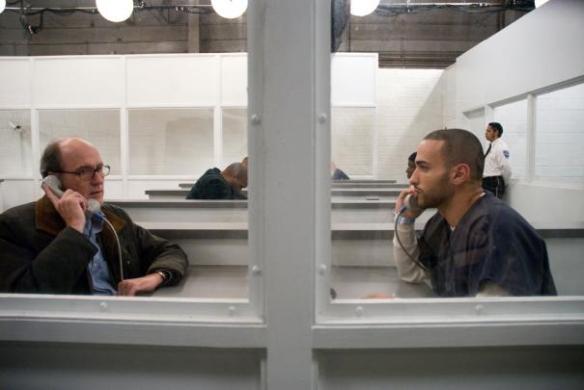(Overture) Richard Jenkins, Oliver Bokelberg, Hiam Abbass, Maggie Moore, Danai Gurira, Haaz Sleiman, Michael Cumpsty. Directed by Thomas McCarthy.
We travel through the world, experiencing it however we can. Some of us embrace life, rolling around in it like a dog in a field of grass, trying to immerse ourselves in every moment. Others hold life at arm’s length, content to watch from a distance, analyze it and take it in intellectually.
Professor Walter Vale (Jenkins) is neither of those sorts. He’s a widower who doesn’t really participate much in the world around him. Oh, he goes through the motions but nothing really affects him much. He goes through his life with the same expression on his face – neither smiling nor frowning, but there is a sadness in his eyes that is telling.
He’s a civilized sort who drinks wine with dinner and loves music. His late wife was a professional classical pianist, and he listens to her recordings but not to reconnect with her so much as to fill the empty room with something that isn’t silence. He teaches the same course as he has for years, not varying so much as a word, allowing little into his world as he can get away with. His life is comfortable. His life is empty.
He’s also an honest man. When asked to present a paper at a conference in New York that he co-authored, he confesses that he only attached his name to it as a favor to a colleague and hasn’t even read the document. Nonetheless, he is dispatched to New York to the conference and goes directly to the apartment he keeps in New York.
When he walks in, he is surprised to find a naked African woman in his bathroom. When the dust settles, we learn that Zainab (Gurira), the naked woman – originally from Senegal – and her boyfriend Tarek (Sleimann), who’s from Syria, thought they were subletting the apartment. They agree to leave, gather their things and walk out the door. Initially, Vale does nothing but for some reason he impulsively goes outside, where he finds them and invites them to stay for the night.
As it turns out, they are decent people and Vale grows to admire their quite different point of view. Tarek is a drummer who plays at various venues around New York, and he teaches Vale some pointers about how to play the djembe. For the first time, Vale takes an interest in life. However, a miscue in a subway station leads to a change of circumstance that affects everyone.
While this is ostensibly a movie about immigration, bureaucracy and culture shock, in reality this is a movie about change. The immigrants are not the visitors, Walter is. He is a visitor to life; not really staying, but just passing through, taking a couple of snapshots and moving on. This is about his journey, not Tarek and Zainab’s.
There are some nice moments when a new character is introduced, Tarek’s mother Mouna (Abbass). Vale develops a bit of a crush on her, but this never would have happened had he not had his sense of living awakened by Tarek. We watch this supremely conservative educator come out of his shell and seeing him completely lose himself to the rhythms in a subway station is downright amazing. Jenkins received an Oscar nomination for his work here. A character actor who often assumes the role of wise father figure, he shows he can also handle lead roles.
This is not a loud, abrasive movie that assaults the senses. It is a quiet movie that is as expressive in its silences as it is in its dialogue. It expects – demands, even – a level of commitment from the viewer that they will find their own meaning and understanding in what they see, rather than handing them all the answers on a plate. In that regard, it is much like life, and that’s really the secret to learning and growing, isn’t it?
WHY RENT THIS: A quiet movie that speaks volumes in its silences. A bravura Oscar-nominated performance by Richard Jenkins deserves to be seen. This is a movie that demands that the viewer take from it what understanding they are willing to work for.
WHY RENT SOMETHING ELSE: May be a bit more cerebral than is to some viewers liking.
FAMILY VALUES: There is some brief implied nudity, some drug references and some sexual innuendo, but nothing worse than you might see on your typical prime time drama.
TRIVIAL PURSUIT: The parking lot in which Walter parks his car after arriving in New York – on East 11th Street between 1st and 2nd Avenue – was torn down shortly after the film was released.
NOTABLE DVD EXTRAS: An instructional guide to playing the Djembe, the drum that Tarek teaches Vale to play in the film.
FINAL RATING: 8/10
TOMORROW: The Invention of Lying

